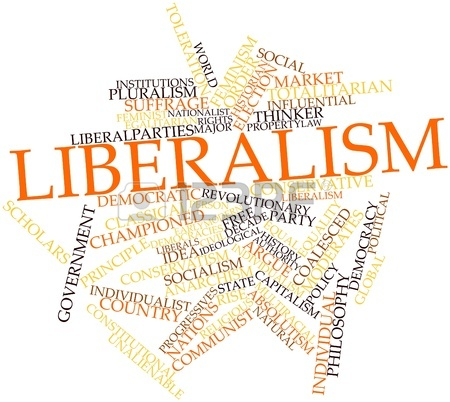It’s increasingly difficult to be a Christian in Canada. But, ask most Christians why it’s difficult and they often say something like this, it’s hard because it use to be we didn’t have so many things to compete with on Sunday – sports, Sunday shopping, both parents working and now on Sundays. Although there is some truth to this statement, it points to the result of, not the underlying reason for Christianity’s decline in western societies. The reason for Christianity’s demise is the universality of liberalism that has become so much a part of our assumed political, economic and social life that we’re no longer aware of its negative influence both on society and the Church. Liberalism assumes the greatest possible freedoms for individuals socially, politically and economically. On the surface, liberalism can do no wrong and is completely in tune with Christian teachings on freedom, love and grace. That is why mainline churches in general have coordinated its ministries with today’s cultural norms. The watering down of core doctrines, e.g. the physical resurrection of Jesus Christ, is the attempt to do just that. But, just scratch the surface of liberalism’s influence on both our culture and Christianity and one will quickly see it’s not all that positive.

For instance, in the economic realm, the advocacy for free markets, companies, banks, and individuals to be freed from the constricting shackles of the bureaucratic state has not benefitted the majority of people, but only the few, i.e., multi-national corporations, CEOs, banks, and the ultra-rich, where most of the wealth is being centralized. The disparagement between rich and poor is increasing, and the middle class is slowly disappearing. In the political realm, populist governments are on the rise among western countries. Trump is the prime example, but it’s also happening in countries like Hungary, Poland and now, Italy. It’s evidenced to a degree in Britain’s Brexit and the recent Ontario election of Doug Ford’s PC government. The problem with these populist leaders and movements is that they tend to divide people into haves and have nots and centralize power in certain groups of people. Lastly, on the social front, liberalism’s insistence that every restriction should be removed from individual choice is now leading to new restrictions of choices of some by the choices of others. Since rival rights and freedoms inevitably collide, the power of whichever group has more political power decides which freedoms to uphold. For instance, it’s generally assumed that transgender people have the right to be called by the pronoun of their choice, such as ‘they’, instead of the typical male/female ones. That is fine, but what about the rights of the individual who does not believe in this assume worldview? What about their rights? Even the suggestion that this person has rights are vehemently rejected by proponents of liberalism. Just listen to the CBC!
What’s particularly problematic about these liberalizing trends is that most people do not have the intellectual training (or, simply don’t care), to question them. Therefore, it’s easy to influence people by appealing to their lower and often distorted instincts and turn issues into black and white ones. For instance, its popular today to blame immigrants for all of a country’s social, religious and economic problems. Although there might be something to this claim, to say it’s the only reason is absurd. Or, blaming religion (often Christianity and Islam in the west), for all of our conflicts is way too simplistic because it does not take into account secular, political forces at play. Or, for example, the notion that if we only liberalize our Christian doctrines to fall in line with the liberal beliefs of our society, people will flood into our churches. Really? The evidence shows the opposite is happening.
People, both Christian and non, today assume liberalism promotes an easy-going and optimistic outlook that celebrates universal freedom, equality and happiness (although I haven’t found anyone yet who exactly knows what happiness is?). But this is far from the case. Liberalism assumes a much gloomier outlook on humanity. It assumes that we are basically self-interested, fearful, greedy and egotistic creatures unable to see beyond our own selfish needs and, therefore, prone to violent conflict. This is evidenced in the fact that increasingly in our society people see the fight for their rights as a zero-sum game, or win/lose situation. Trump again, in his recent imposition of trade tariffs on western allies, is a prime example of this. But Trump is merely reflecting how all of us tend to relate to the world. For instance, the tendency in many of us (many Christians as well), is to see our money as a vehicle to maximize our personal happiness instead of all of society’s well-being. We often say, I’ve worked hard for my money and so I deserve to benefit from it. Accordingly, we constantly complain about our taxes being too high, that the Church is always asking for money, and how social assistant programs encourage lower income people from getting off these same programs. Meanwhile, we’re quick to get upset when the same social programs do not meet our needs when we need them.
So, what do we make of the liberal dilemma we Christians face in our culture? First of all, it’s important to recognize we’re part of the problem liberalism has caused in both our society and the Church. We are part of the problem because of our uncritical acquiescence to the liberal tendencies that are selfish in nature and contrary to the Gospel. Although Christians should promote, from a Gospel perspective, the freedom and rights of individuals, we should not do so uncritically especially when it leads to idolatry. That happens when the worship of the self, usurps worship of the one true Lord God, Jesus Christ. Liberalism will tell you that worshipping God has been the reason for our problems in society. But that is not true. Even when governments in the name of Christianity causes conflicts and wars it’s not because of what the God of the Gospel has taught. It’s because of the underlying selfish liberal tendencies in government policies that just happen to adopt a Christian label when it goes go to war.
Second, if our worship is to be true to our God, we must therefore, attend to what He has to teach us about the world, not just what liberalism is saying to us. I am not suggesting that there are no truths in liberalism or conservatism. Yet, all human constructs and ideologies must be critically examined through the critical lens of Christian understanding of the world as we learn it via Scripture, the Church and our Christian Tradition. It’s important to hear critically our culture’s messages when they are transmitted to us through the CBC, in books, TV shows, and our institutions of learning. But, for that to happen it’s important to worship regularly on Sundays even though it’s not popular among our secular friends, regularly read and study scripture on our own and with other Christians and read informative Christians books by authors such as C.S. Lewis who offers helpful critical insights into our culture from a Christian perspective.
Lastly, it’s important to be critical in a positive way. As followers of Jesus we are not expected to shove his teachings down anybody’s throat, but simply to invite them to consider what He’s offering. For this to happen we need to prepare the soil so that the seed of the Gospel may take root. The best way to do this is by being good listeners and charitable with people who have different opinions of the world from what we have. Don’t react defensively when you hear something that you disagree with even when the other person might react that way to what you have to say. Most importantly, remember to always love and care for the person you disagree with unconditionally. Ultimately, only Jesus can change peoples’ hearts and minds. But, He has a better chance of doing this if we fertilize the soil in peoples’ hearts with our patience, love and carefully thought out responses.

